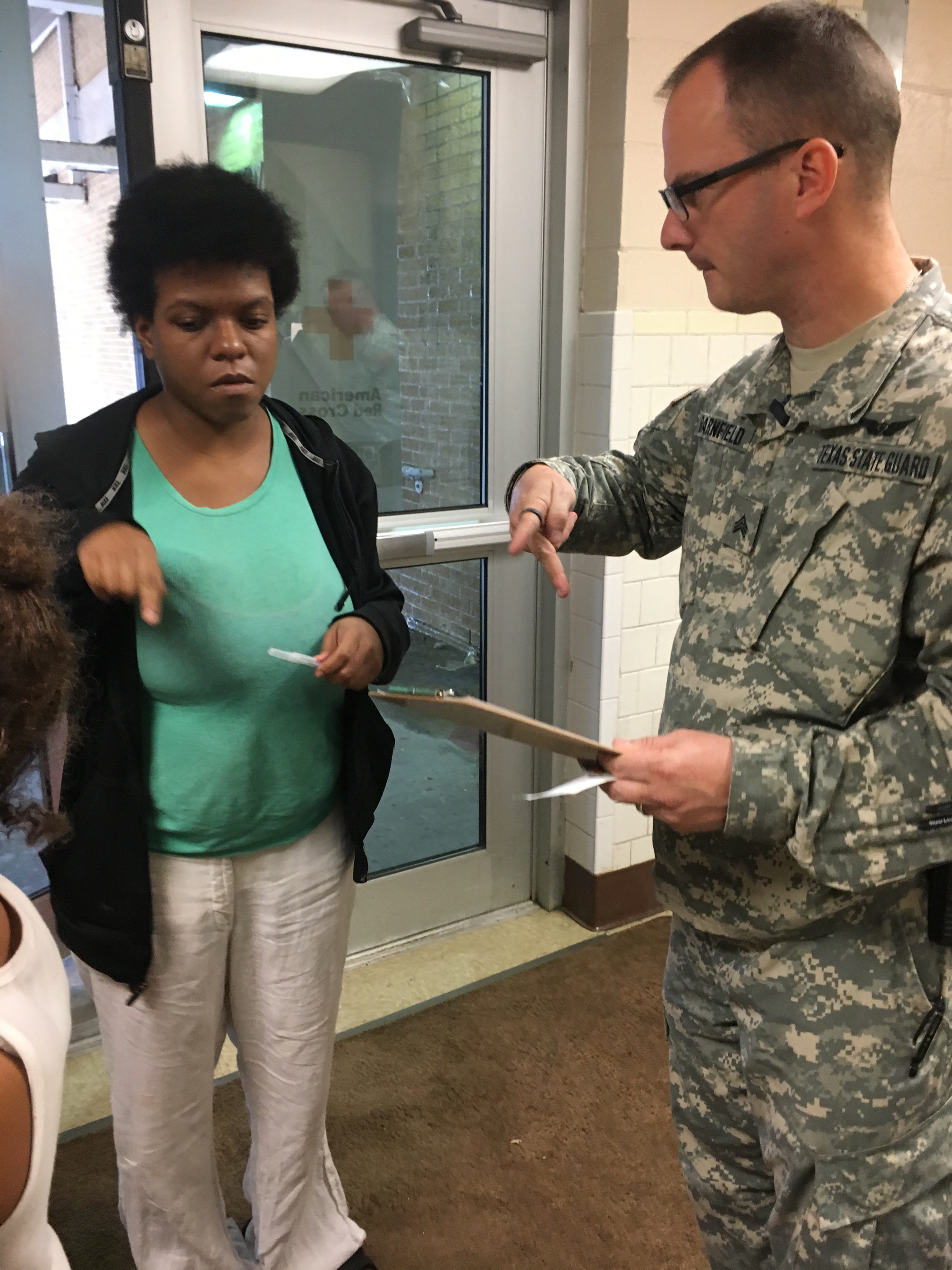Story by Capt. Esperanza Meza
19th Regiment, Texas State Guard Public Affairs
 Sgt. Allen Barnfield, 19th Regiment, Texas State Guard, communicates using sign language with a shelter guest during Hurricane Harvey at Athens Elementary School, San Antonio, Texas, August 27, 2017. (Texas State Guard photo by Capt. Esperanza Meza)
Sgt. Allen Barnfield, 19th Regiment, Texas State Guard, communicates using sign language with a shelter guest during Hurricane Harvey at Athens Elementary School, San Antonio, Texas, August 27, 2017. (Texas State Guard photo by Capt. Esperanza Meza)
Whether rescuing families and pets from flooded homes, lending a helping hand to parents and children who need a place to sleep in a shelter, or distributing basic necessities and medical care during a natural disaster or emergency, the Texas State Guard knows that communicating with people is vital to every mission. When every minute counts these guardsmen do not want language to become a barrier for getting their fellow Texans help.
Sgt. Allen Barnfield, 2nd Battalion, 19th Regiment, Army Component, decided to learn American Sign Language because he wanted to assist people who could not hear. Last summer when Hurricane Harvey displaced tens-of thousands of residents, he used his sign language skills to communicate with eleven evacuees at shelters.
“Being able to interpret for the deaf evacuees made me realize how important it is to be able to communicate with them,” he said. “The fact that I could provide them with information through sign language made them feel much better about staying in the shelter.”
Barfield said that he was brought to tears when one of the children he had interpreted for drew him a picture to thank him for making their stay more bearable.
For another member of the Texas State Guard, it was his knowledge of Spanish that helped place a frightened young by at ease when carrying him to a rescue boat.
“If time is of the essence and English skills are limited, providing direction and guidance in their language gives them confidence that we will get their family to safety,” said Master Sgt. Robert Lewis, 3rd Battalion, Texas Maritime Regiment.
While the size and geographic diversity of the state makes it a melting pot, guardsman like Cpl. Zaw Maung of the 19th Regiment, who speaks Burmese, become a critical language asset during times of need. Maung used Burmese with shelter guests at the NRG Stadium in Houston during Hurricane Harvey. He created signs and gave announcements in Burmese and worked as a translator at a help desk.
“If I had not been in the Texas State Guard, I would not have been in the position to help this community,” said Maung. Communicating in my native tongue made the Burmese guests feel a little better during a most distressful time because of the hurricane."
During Operation Lone Star, the largest medical humanitarian operation in the country and mass casualty training exercise in the Rio Grande Valley, Capt. Margarita Elestwani, Texas Medical Brigade, assisted patients and physicians through her ability to communicate medical terms in Spanish, Tagalog (Filipino language) and French. Another Texas Medical Brigade member at OLS, who also speaks Tagalog, Capt. Abram Braza, 2nd Battalion, used his ability to communicate in a Filipino dialect to reunite a lost elderly Filipino man with his family.
Although those with multilingual skillsets help serve fellow Texans, there are times these language capabilities also help communicate with the members of the media and dignitary visitors, further enhancing the delivery of needed messaging. For Staff Sgt. Gregory Illich, 1st Battalion, 8th Regiment, his Spanish fluency enabled him to serve as an interpreter when a Chilean military delegation observed OLS.
“One member of the Chilean delegation gave me a challenge coin for assisting them and I gave him my Texas flag patch from my uniform,” said Illich. “I was honored to be able to use my fluency in Spanish to assist the Rio Grande Valley community as well as act as interpreter for our Chilean guests.”